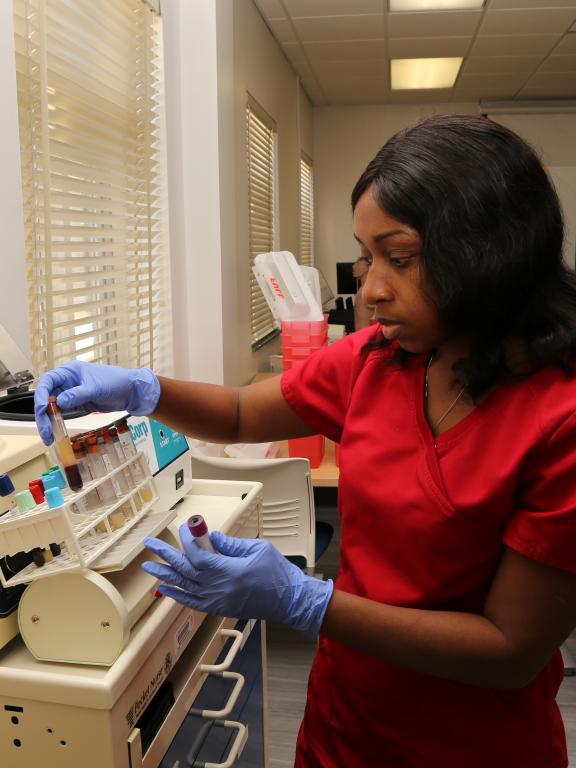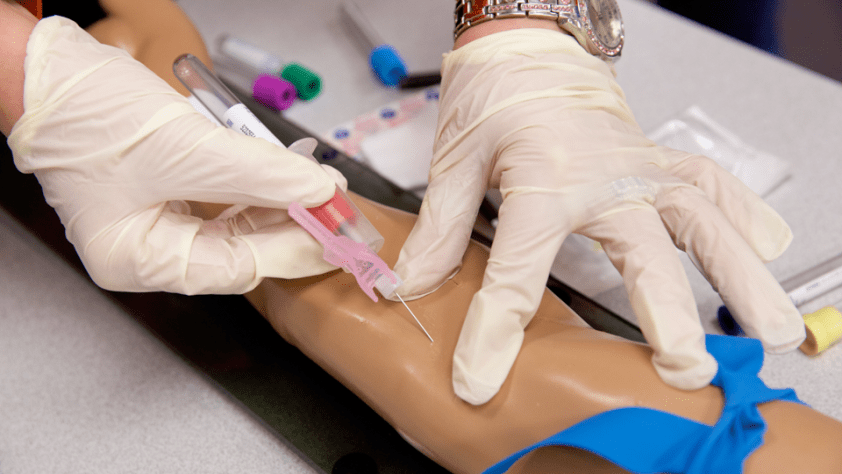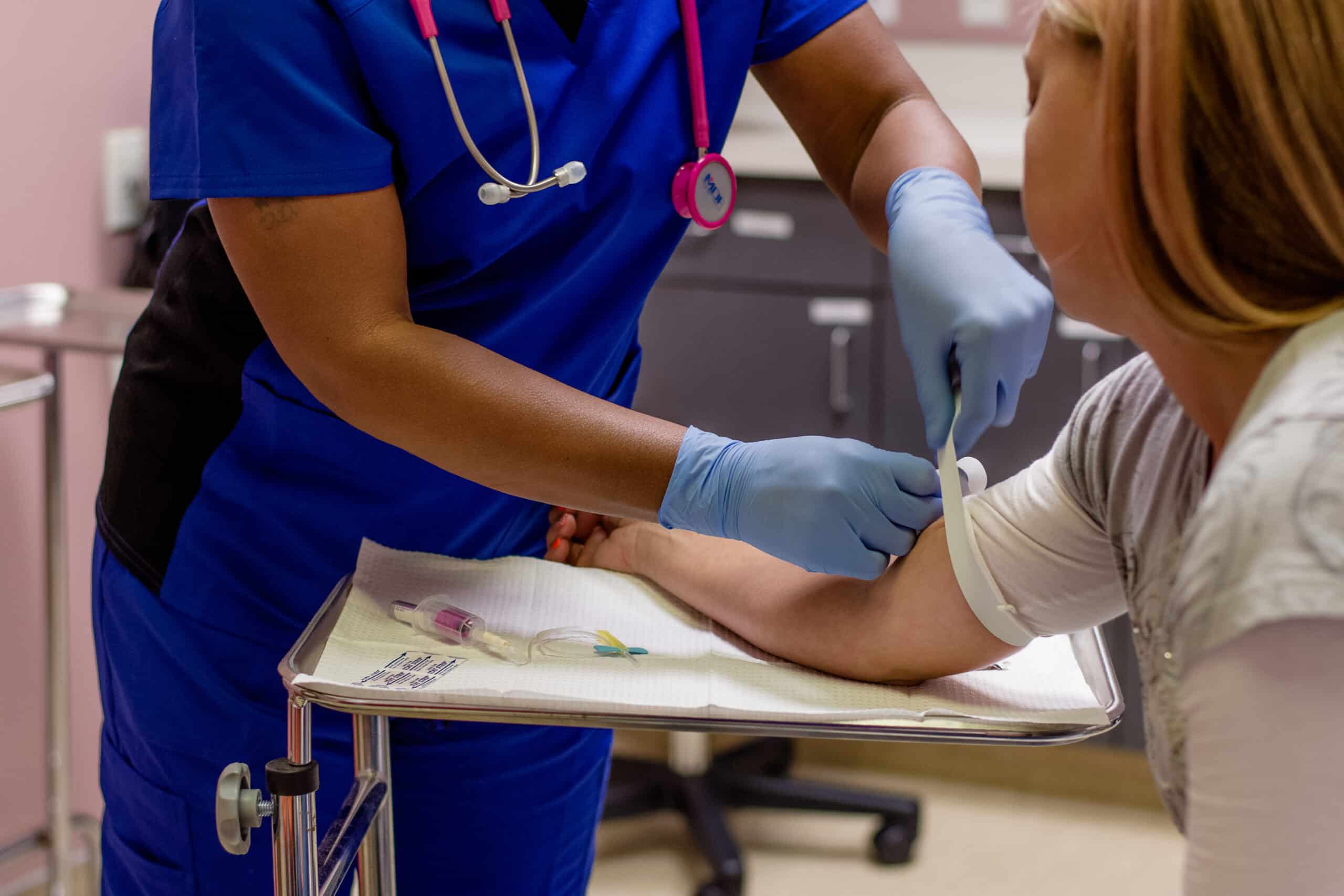How a Phlebotomy Training Course Lays the Foundation for a Promising Healthcare Career
How a Phlebotomy Training Course Lays the Foundation for a Promising Healthcare Career
Blog Article
The Path to Qualification: Comprehending the Phlebotomy Educating Course Trip and Its Significance
As you think about the course to accreditation in phlebotomy, it's essential to comprehend the function you'll play in healthcare. Your training will cover necessary abilities, from blood collection methods to patient communication.

The Duty of Phlebotomists in Medical Care
Phlebotomists play a necessary role in the healthcare system, acting as the vital web link between patients and important diagnostic screening. You'll execute blood attracts, guaranteeing examples are collected properly and safely. Your expertise helps in identifying medical problems, checking health and wellness, and leading therapy choices.
In your everyday communications, you'll need to develop trust fund with clients, making them really feel comfortable during what may be a stressful experience. You're liable for classifying and taking care of examples very carefully to stop contamination or mistakes, which could impact examination results.
Yet, you'll frequently function together with medical professionals and nurses, interacting important info concerning individuals' problems. Your role is essential in keeping the process in medical care settings, guaranteeing timely and precise results. By grasping your skills, you contribute meaningfully to client care, making you an essential part of the clinical group. Welcoming this obligation is vital to your success as a phlebotomist.
Summary of Phlebotomy Training Programs
When checking out phlebotomy training programs, you'll find numerous kinds created to fit different routines and learning designs. Each program helps you develop essential skills like blood collection and person communication. Recognizing these choices is key to choosing the best path for your occupation.
Kinds of Training Programs
Several kinds of training programs are readily available for those looking to end up being proficient in phlebotomy. Additionally, some medical facilities and clinics offer on-the-job training programs, offering functional experience while you discover. Whatever path you select, each program intends to outfit you with the necessary abilities for a successful phlebotomy career.

Secret Abilities Created
Mastering phlebotomy calls for a collection of crucial skills that are created with detailed training programs. Furthermore, communication abilities are essential; you'll need to interact with people, describe procedures, and placed them at ease. Each of these abilities is vital for your success as a licensed phlebotomist, making you a valuable asset in any type of medical care setting.
Key Elements of a Phlebotomy Training Course
In a phlebotomy course, you'll concentrate on vital topics that lay the foundation for your future career. You'll participate in hands-on training that permits you to apply what you have actually found out in real-world settings. Both the core curriculum and functional experience are crucial for your success as a phlebotomist.
Curriculum Review
While pursuing a phlebotomy training program, you'll experience a curriculum developed to equip you with essential skills and knowledge. Phlebotomy school. This educational program typically consists of composition and physiology, concentrating on the blood circulation system and comprehending blood elements. You'll also learn more about various kinds of blood collection methods, consisting of venipuncture and capillary puncture strategies
Furthermore, infection control and safety and security methods are vital parts, ensuring you know just how to keep a sterilized setting. You'll study patient interaction, highlighting communication and compassion, which are vital for reducing person anxiety.
Hands-On Training Experience
Getting hands-on experience is a crucial component of your phlebotomy training program. This useful training enables you to apply what you've learned in a real-world setup, enhancing your abilities and confidence. You'll exercise venipuncture methods, discover how to manage different kinds of samplings, and get familiar with the equipment made use of in the area. Under the advice of experienced instructors, you'll improve your skills, guaranteeing you're More about the author prepared for any kind of situation you may encounter.
In addition, you'll get the opportunity to engage with people, which is important for establishing your communication abilities. This combination of technical proficiency and social skills is vital for your success as a qualified phlebotomist. Ultimately, hands-on training is where theory fulfills technique, solidifying your understanding and preparedness for certification.
Certification and Licensing Requirements
Before you can start your occupation in phlebotomy, it is vital to recognize the qualification and licensing demands that differ by state. A lot of states require phlebotomists to hold a qualification from an identified company, such as the National Phlebotomy Organization or the American Culture for Medical Pathology. These accreditations usually entail passing a test that examines your expertise and abilities in the field.
In enhancement to accreditation, some states have details licensing demands. You might need to finish a certain number of hours in clinical practice, send proof of training, or undergo a background check. It is essential to research your state's policies to make certain you fulfill all required criteria.
Staying informed concerning these demands not just assists you secure a placement however additionally enhances your credibility as a professional. By fulfilling these demands, you'll be well on your means to a successful profession in phlebotomy.
Hands-On Training and Practical Experience
Hands-on training and practical experience are necessary components of your phlebotomy education and learning, as they permit you to use academic understanding in real-world situations. Throughout your training, you'll engage in monitored venipuncture, learn correct methods, and come to be accustomed to different blood collection devices. This direct involvement is vital for building your confidence and refining your skills.
You'll function carefully with seasoned experts who can lead you through the nuances of client interaction and sample handling. Each practice session not just reinforces your understanding but additionally prepares you for the fast-paced atmosphere of health care settings.
Furthermore, lots of programs include medical turnings, allowing you to experience varied settings, from healthcare facilities to outpatient clinics. This exposure aids you adapt to different challenges and individual needs, ensuring you're well-prepared for your future role. Accept these possibilities, as they're important to ending up being a competent and thoughtful phlebotomist.
Obstacles Dealt With Throughout Training
While gaining hands-on experience is necessary, it is necessary to acknowledge the obstacles that can emerge throughout your phlebotomy training. You may come try these out across anxiety when doing treatments on real individuals, especially if you're brand-new to the setting. The pressure to obtain everything right can be frustrating. Additionally, grasping the skills needed for blood attracts takes technique; you may struggle with technique initially.
Time monitoring can likewise be a difficulty, as harmonizing concept, practical sessions, and personal commitments can really use this link feel challenging. You might deal with varying learning paces among your peers, leading to feelings of self-doubt if you assume you're falling back. Adjusting to the different personalities of instructors can be challenging, as each might have an one-of-a-kind training style.
Identifying these barriers beforehand can prepare you for success and aid you establish durability throughout your training trip.
Career Opportunities After Accreditation

As you gain experience, you could also consider concentrating on areas like pediatric or geriatric phlebotomy, satisfying details individual demands. Some phlebotomists pick to progress their jobs by ending up being lab service technicians or seeking additional education and learning in health care fields.
Furthermore, your accreditation can result in roles in training or supervising brand-new phlebotomists, enabling you to share your expertise. With the medical care industry consistently expanding, your skills will constantly remain in demand, paving the method for a secure and satisfying occupation. Accept the opportunities waiting for you!
Often Asked Concerns
What Is the Common Period of a Phlebotomy Educating Program?
Phlebotomy training courses usually last around four to eight weeks. You'll engage in hands-on technique, class guideline, and on-line discovering. Completing this training prepares you for certification and a rewarding job in health care.
Are Online Phlebotomy Courses Available?
Yes, on-line phlebotomy courses are available. They use flexibility and ease, permitting you to study at your very own speed. Simply validate the program is approved to meet qualification requirements and acquire useful abilities for your occupation.
Just How Much Does Phlebotomy Training Commonly Price?
Phlebotomy training usually sets you back in between $700 and $2,500, relying on the program and location. You should think about elements like program size, consisted of products, and hands-on experience when selecting the ideal training for you.
What Are Common Prerequisites for Phlebotomy Training?
Common requirements for phlebotomy training often include a secondary school diploma or GED, immunizations, and a history check. Some programs might additionally require fundamental healthcare understanding or qualifications, guaranteeing you're prepared for hands-on training.
Can I Work While Completing My Phlebotomy Training?
Yes, you can function while completing your phlebotomy training. Lots of trainees balance tasks with their studies, but make sure to manage your time properly to assure you fulfill both work and training dedications efficiently.
Report this page